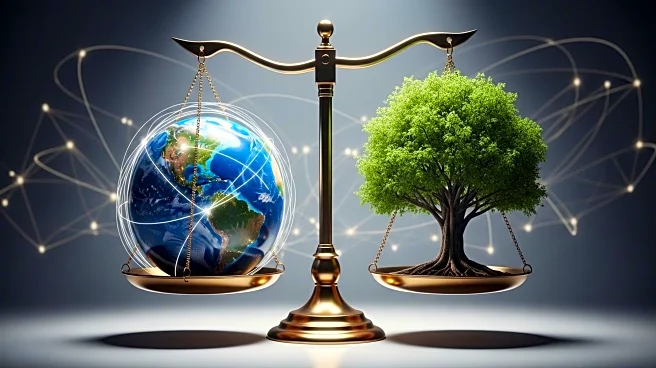What is the story about?
What's Happening?
President Trump has imposed a 50% tariff on Indian goods, prompting a response from RSS Chief Mohan Bhagwat. Bhagwat has called for increased self-reliance and the use of 'Swadeshi goods' in India. He emphasized that global trade should be free from pressure and conducted voluntarily. This development is part of ongoing trade tensions between the United States and India, which have seen various tariffs and trade barriers implemented by both nations. Bhagwat's comments reflect a push for India to strengthen its domestic production capabilities and reduce dependency on foreign imports.
Why It's Important?
The imposition of a 50% tariff by President Trump on Indian goods could have significant implications for the Indian economy, particularly for industries reliant on exports to the United States. This move may lead to increased costs for Indian exporters and could affect bilateral trade relations. Bhagwat's call for self-reliance highlights a potential shift in India's economic strategy, focusing on boosting domestic industries and reducing foreign dependency. This could lead to changes in trade policies and economic planning in India, impacting sectors such as manufacturing and agriculture.
What's Next?
India may respond to the tariff imposition with its own trade measures, potentially escalating trade tensions between the two countries. The Indian government might explore strategies to mitigate the impact of tariffs on its economy, such as negotiating trade agreements or seeking alternative markets. Additionally, Bhagwat's advocacy for self-reliance could influence policy discussions within India, leading to initiatives aimed at strengthening domestic industries and reducing import reliance.
Beyond the Headlines
The call for self-reliance by RSS Chief Mohan Bhagwat may resonate with broader nationalist sentiments in India, potentially influencing cultural and political discourse. This could lead to increased support for policies that prioritize domestic production and consumption, aligning with the 'Make in India' initiative. The trade tensions also highlight the complexities of international trade relations and the challenges faced by countries in balancing global economic integration with national interests.
















